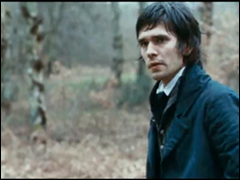 Don’t listen to him. Mr. Voice-Over-Man. He’s one man, with one vocal timbre, and an uncanny knack for taking a sensitive, intelligent, nuanced film, and making it sound like corn syrup. Don’t listen to the voice in the preview. I did. It made me queasy. I suppressed the gag reflex only by remembering that a trusted, smart, literate friend recommended the film to me after seeing it at the Toronto film festival. And I’m glad she did.
Don’t listen to him. Mr. Voice-Over-Man. He’s one man, with one vocal timbre, and an uncanny knack for taking a sensitive, intelligent, nuanced film, and making it sound like corn syrup. Don’t listen to the voice in the preview. I did. It made me queasy. I suppressed the gag reflex only by remembering that a trusted, smart, literate friend recommended the film to me after seeing it at the Toronto film festival. And I’m glad she did.
“Bright Star” is visually stunning. But beyond this, the immediacy of the acting, the intensity of commitment in each moment, and, of course, the respectful treatment of poetry, make this a movie that stayed with me long after the final recitation of “Ode to a Nightingale” over the simple scrolling credits. This is a romance with no sex, and no happily ever after. In fact, after witnessing the scene in which Fanny learns of John’s death, if your heart isn’t smashed into glittering pieces, you probably don’t have one.
I memorized “Bright Star” as a teenager, shortly after memorizing Frost’s “Choose Something Like a Star”–and was led from one to the other by Frost’s mention of “Keats’ Eremite.” This film brought back the magnificence of adolescent angst, that deepest yearning for some ineffable ideal–the very essence of romance. It is a fitting tribute to the man himself–who died young after a life marked by external suffering, and great inner beauty. If you love poetry, and especially the Romantics, do yourself a favor–along with your cheapskate bag of microwave popcorn, sneak your own inner romantic in to the darkened theater, and witness the fleeting brilliance of this portrayal one of literature’s bright falling stars.